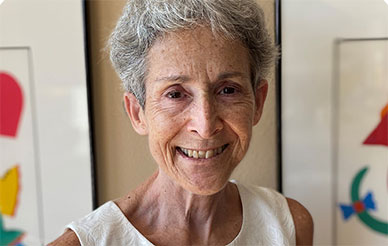Strengthening Commitment to Comprehensive Neurological Care

Ellen and Chuck Wright show gratitude with their gift to help establish a new clinic
People with chronic neurological conditions like multiple sclerosis (MS) understand how frustrating it can be to determine the best treatment strategy and plan for the future — sometimes even just to feel heard. Ellen Wright is all too familiar with navigating the complexities of her condition, but found partnership and hope in the holistic approach taken by Revere “Rip” Kinkel, MD, director of the multiple sclerosis program at UC San Diego Health and professor of neurosciences at UC San Diego School of Medicine.Today, Ellen and her husband Chuck — both UC San Diego alumni — are showing their gratitude and improving care for others through a generous contribution that will help establish the Comprehensive Chronic Neurological Clinic at UC San Diego Health. The new center will enable Dr. Kinkel and other world-class physician-scientists in neurology at UC San Diego Health to form a hub of expertise focused solely on strengthening and expanding their collaborative, whole-person approach to care. It will help to centralize care for those with chronic neurological conditions such as multiple sclerosis, amyotrophic lateral sclerosis (ALS), muscular dystrophy, Parkinson’s disease, and other movement disorders.
“Chronic diseases are different than what typically shows up in a doctor’s office,” says Ellen. “There is no immediate solution. It’s a long-term proposition. It requires a very different relationship from both a patient and provider standpoint.”
Ellen’s own story offers a case in point. Her symptoms began appearing in 1982, but she wasn’t diagnosed until 14 years later. She raised a family and ran her own business, but MS began to limit how much energy she had each day. Her symptoms would often fluctuate. As with many chronic conditions, it was hard to determine whether or when to start drug treatment; use assistive devices; or get referrals to psychologists, physical therapists, and other specialists to help manage challenges. For example, if Ellen had an appointment early in the day and seemed strong and alert, her doctor wouldn’t realize that she may need a wheelchair by afternoon unless he or she was collaborating with her to fully assess her needs and address concerns.
“Part of me felt like we were on our own,” says Chuck, a retired physician himself. “What’s life going to be like? How do we adjust to anything that could be just pain in the wrist to not being able to walk? Watching someone you love deteriorate who had a thriving business, who was very productive and a mother of kids, all of a sudden not be able to do those things is very hard.”
Ellen and Chuck met Dr. Kinkel when they retired to San Diego after 20 years working abroad. They were impressed with his work in neurology and appreciated the thorough and well-rounded care he provided.
“It makes so much of a difference if someone is identifying with me as a person and just taking a few minutes to check in,” says Ellen. “I’ve met a tremendous number of people with MS who put their best foot forward, but nobody asks us follow-up questions: ‘what are you doing for yourself? What would it take to make your life better?’ That is incredibly important.”
“Ellen and Chuck understand that successful long-term management of chronic neurological disease requires an integrative care model customized to the personal characteristics and needs of each patient,” says Dr. Kinkel. “Through their gift, the Wrights are not only improving care for our patients, but also helping us to improve the accepted standards of care in treating chronic conditions. This is the kind of work that makes UC San Diego a leader in neurology, and they are helping us take it to a new level.”
The Wrights were further inspired by the aspirations of James Brewer, MD, PhD, for UC San Diego School of Medicine’s Department of Neuroscience, for which he serves as chair. Neurology is one of 10 nationally ranked specialty areas at UC San Diego Health. One of Dr. Brewer’s top priorities is to make the most of the department’s expertise by bringing faculty members and complimentary care providers together in a way that allows them to deliver an even higher standard of care while creating a hub of innovation in the treatment of chronic neurological conditions. “We wanted to help bring that goal to the forefront,” says Chuck. “We feel our money is invested in the right place.”
“Many lifestyle, social and mental health issues that have a direct impact on health care outcomes are not addressed in the current system of care or are addressed only at a moment of crisis,” says Dr. Brewer. “Patients with chronic neurological disease have unique challenges. As their individual diseases progress, often their access to specialty care and services decreases. An integrated comprehensive care center is the answer, and we are so proud to see it begin to take shape thanks to the Wrights.”
The Comprehensive Chronic Neurological Clinic will allow UC San Diego Health to leverage its interdisciplinary strengths in the neurosciences to deliver exceptional, personalized care for complex neurological conditions. As a one-stop-shop, it will also alleviate the current patient burden of care navigation. Within one clinic, patients will have access to experts in the neurosciences and a support team to help streamline the evolving and sometimes complex needs at different stages of a chronic illness. It will also provide patients and their loved ones and caregivers with the information and resources they need to optimize care beyond the clinical setting.
“Patients are coming in because the problem has overwhelmed them, and they need whatever help is available to improve their quality of life,” says Ellen. “We hope to see this new clinic be a place of hope and support — and that others will join us in supporting its work.”
Learn more about Health and Medicine giving opportunities.